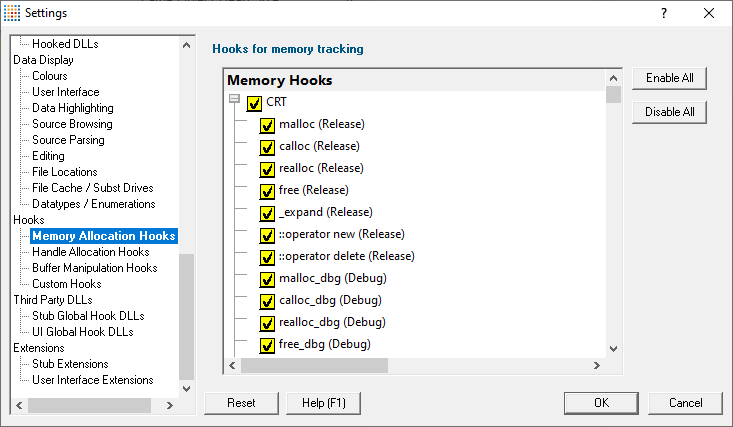The Memory Allocation Hooks tab allows you to enable and disable every hook or group of hooks that Memory Validator uses to track memory allocations.
The picture below doesn't show all the options, but the default is to have everything enabled (ticked):

Memory hooks
Enable or disable a hook by ticking or unticking the yellow boxes.
 Note that because the C runtime is provided in both Release and Debug, some function names are present twice, with their status indicated in brackets.
Note that because the C runtime is provided in both Release and Debug, some function names are present twice, with their status indicated in brackets.
•Enable All  ticks all the hooks, enabling everything
ticks all the hooks, enabling everything
•Disable All  unticks everything
unticks everything
Memory hook groups
All the hooks in the following groups can be enabled and disabled at once by ticking the group checkbox
•CRT  the C runtime hooks for release and debug libraries MSVCRT.DLL / MSVCRTD.DLL
the C runtime hooks for release and debug libraries MSVCRT.DLL / MSVCRTD.DLL
•Memory allocation  the HeapAlloc, VirtualAlloc, GlobalAlloc and LocalAlloc function groups
the HeapAlloc, VirtualAlloc, GlobalAlloc and LocalAlloc function groups
•LocalAlloc allocations by other functions  functions that use LocalAlloc to allocate workspace that should be freed by the caller
functions that use LocalAlloc to allocate workspace that should be freed by the caller
•GlobalAlloc allocations by other functions  functions that use GlobalAlloc to allocate workspace that should be freed by the caller
functions that use GlobalAlloc to allocate workspace that should be freed by the caller
•CoTaskMemAlloc allocations by other functions  functions that use CoTaskMemAlloc to allocate workspace that should be freed by the caller
functions that use CoTaskMemAlloc to allocate workspace that should be freed by the caller
•COM/OLE Allocators  CoTaskMemAlloc function group and IMallocSpy
CoTaskMemAlloc function group and IMallocSpy
•BSTR Allocations  SysAllocString function group and VariantClear
SysAllocString function group and VariantClear
•Net API Allocations  NetApiBufferAllocate function group
NetApiBufferAllocate function group
•Misc Allocations  miscellaneous functions that allocate and deallocate objects for various API areas such as security and encryption
miscellaneous functions that allocate and deallocate objects for various API areas such as security and encryption
•Fortran 95 Allocations
•Delphi allocations
 For details on the contents of each of these hook groups consult the Hook Reference.
For details on the contents of each of these hook groups consult the Hook Reference.
Reset All - Resets all global settings, not just those on the current page.
Reset - Resets the settings on the current page.